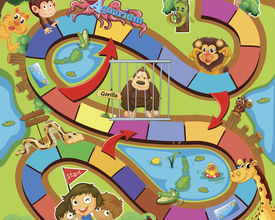Apart from networking and changing the environment, people attend events to gain knowledge and learn new things. But the typical classroom event format (with the speaker talking and the audience taking notes) doesn't seem to work anymore.
Nowadays, attendees are eager to experience new learning formats and actively participate in the knowledge transfer process. As Carlson Wagonlit Travel's 2018 Meetings and Events Future Trends report suggests, "Presentations need to be memorable and interactivity is a great way of encouraging that." The authors of the report continue by arguing, "Gamification is spicing up M&E (meetings and events)."
Considering this, let's be honest for a second: do you really know what gamification is? We'll help you. In one interview offered for eventplanner.tv, Bo Krüger shared a great definition: "Gamification is about bringing game components, game elements, and game principles into non-game context."
"What does gamification have to do with the learning experience of my attendees?" you might be asking. Good question! According to a 2016 report released by Oxford Analytica, different game mechanisms and techniques can be used in educational environment to optimize the learning process. As the study authors specify, gamification has become a powerful tool for educators.
Considering this, it may be a good idea to apply the same strategy for a better learning experience for your attendees. Here's a short introduction as to what you can do as an event professional:
Tip 1. Set up an epic meaning
What makes games so fun and addictive? As researcher Jane McGonigal explains, "Games are showing us exactly what we want out of life: more satisfying work, better hope of success, stronger social connectivity, and the chance to be part of something bigger than ourselves."
Engaging in a meaningful experience awakens our desire to evolve and become better. We aren't afraid to confront challenges anymore, or deal with difficult tasks. Use this idea to improve your attendees' learning experience by providing an epic meaning to your event.
To do so, you could promote the end goal of the learning process. For example, if you're planning a tech conference, make everyone feel part of something bigger through messages such as, "By the end of this event, you'll have the knowledge to launch a truly disruptive startup", or "Become part of a community that changes the world through concrete actions!" Let your guests understand the extraordinary and epic character of the event and the knowledge your speakers will provide.
Tip 2. Mix fun with adventure
Transform learning into an exciting and fun experience for your attendees. Make sure your speakers deliver engaging presentations that will incite your guests' curiosity. To add some adventure, you could set up live quizzes during the event, which is a great way to keep your attendees' interest.
Tip 3. Stimulate the cooperation
Gamification is usually based on competition (winning badges or becoming first on scoreboards), but it can also foster cooperation. Just think about all the video games people love to play. To set up a friendly environment and improve the learning experience of your attendees, organize multiple engaging workshops and group challenges. By doing so, you'll foster cooperation and encourage the audience to put their newly acquired knowledge into practice.
Tip 4. Assure a smart progression
The great thing about video games is that you don't have "to conquer the empire" or "kill the monster" at the beginning. You gradually learn to use your skills, easily move in the space, and get used to your character. Then, you start having different assignments that eventually become more complex. This mechanism assures your constant engagement and provides a gradual evolution of your role in the game. Translating this aspect into a good practice for events, avoid overwhelming your attendees with too much information and long sessions. Make their learning experience as friendly as possible, and instruct the speakers to share their knowledge in "chewable" chunks.
Tip 5. Offer enticing rewards
Incentivize your attendees. Give them unexpected rewards for correctly answering the questions to live quizzes or applying the new information correctly. This will help them create positive associations related to their learning experience and increase their self-esteem. Make the attendees feel good about the progress and effort they made to understand the knowledge they gained at your event.
Wrap up
Designing the attendee learning experience requires time, dedication, and effort. Gamification is one strategy that can help you set up an engaging knowledge transfer environment. Don't hesitate to use the game strategy and mechanisms to enhance the way your attendees will digest the new information. Engage them by letting them feel part of something bigger and by setting up epic environments. Provide challenges that require cooperation, assure a friendly learning progression, and incentivize your audience's success.




